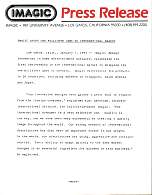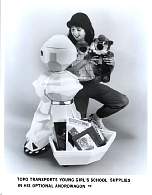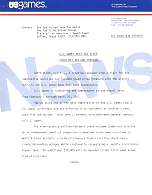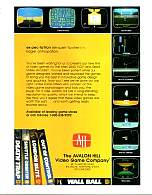In the Beginning...
| Check out this edition's CES Gallery by
clicking any of the thumbnails below |
 |
 |
 |
 |
In years past there were many fun reasons to attend a CES (Consumer
Electronics Show) or E3, One reason naturally was to learn about, and play, all
of the new and exciting (ok, not all were exciting) games that may or may not
have been released during the coming year. Another reason was to meet
celebrities, both inside and outside of the gaming industry. Where else could a
computer geek get his photo taken with the porno star Traci Lords? But if you
had a press pass, a pass which was held in high-esteem during the early days of
E3 and the formidable gaming years of CES, then you could venture to a room in
the venue, that very few others could enter: The Press Room! And inside the
press room, stacked around the four walls, were treasures worth far more than
many of the games outside: The Press Kits!Today, press passes are a dime a dozen. Anyone with a printer and a website
could produce a relatively real looking company card and gain access to the
pressroom. But there is a trade off. If you do find anything in the Press Room
these days, most likely its going to be a CD-ROM filled with information that
the general public had already known about for months. The few companies that
still produce real press kits, such as Sony, keep them at the exhibits, and even
if you have a press pass, you’re not going to get one. After your press pass
gets scrutinized you’re told that they ran out of press kits but you could get
the same information from their website. And even if you do somehow get yourself
a press kit, all you’re going to find inside are pages of text press releases,
probably without any photos.
It wasn’t always like that.
My experience with press rooms and press passes began in 1982 when I began
writing ABC To The VCS, my directory of Atari 2600 games. During the initial
writing it became apparent very early that even if I found someone to publish
the book, the book itself would be totally out-of-date by the time it reached
bookstore shelves. In order for the book to be current upon its release I needed
to know in advance what games would be coming out. The problem was that I had no
credibility in the industry. Although I had a writing background, I was not a
journalist.
At that time I was working for a New York-based video store called
Slavemart, uh, I mean Savemart. They hired me on the pretext that would run
their soon-to-be videogame departments (they wound up only selling the Emerson
Arcadia 2001 but that’s another story altogether). Anyway, one day I was at work
reading a video trade magazine and I saw an ad for the Winter 1983 CES. I had
heard about CES before and I knew that new games would be on display. And my
ticket to that was in the ad. Since I worked in a video store I was able to use
my store to get a retailer pass. Nobody had to know that I didn’t represent the
store.
It’s amazing what you can get done when you don’t know what you’re doing.
Somehow I managed to get an inexpensive room at the Landmark Inn in Las Vegas.
It’s not there anymore but when it did exist it was directly across the street
from the Convention Center where CES is held. Compare that to the twenty miles I
had to drive each day to get to and from E3 last year.
Once I got inside I was in heaven. Not only did I get to play all of these
neat games that weren’t out yet, but I also got to see the legends in the
industry. It was at the 1983 Winter CES that I saw Ralph Baer, Nolan Bushnell,
and David Crane for the first time. Unfortunately I soon learned that just being
at the show wasn’t going to help me get my book finished. I went to every
exhibit that was showing games for the 2600 and I learned that just being at CES
wouldn’t be enough to get the information that I needed. There were literally
dozens of new games on display and I realized that I wouldn’t be able to
remember all of these games with just my notebook and pen. Sure I could describe
them in my notebook to the best of my ability but I didn’t have any screen shots
and I feared that I wouldn’t remember some of them from my descriptions alone.
So I went to the registration desks at each exhibit and explained to the
receptionists about the book that I was writing. The first thing they saw was my
retailer badge and questioned why I didn’t have a press badge. Some of the
vendors, such as Lindy Jansen of Telesys, were sympathetic and gave me advance
press copies of their games. However most of them told me that all of the press
kits were in press room and I had them from there. Unfortunately, you needed a
press badge to get into the press room. Well I didn’t travel all the way to Las
Vegas to be stopped only ten feet from my quarry! I asked around and sought
Allan Schlosser, the Director of Public Affairs for the EIA, the organization
that ran CES. When I found him I told him my dilemma he gave me permission to
run into the press room, grab what I needed, and stay out of everybody’s way. He
also promised me press badges for future shows.
And when I entered the pressroom I felt like I found the Holy Grail. What
greeted me were hundred of press kits just for the taking. And even though I
only took those that had 2600 information, I went home with a considerable
number of press kits.
Today when you receive a press kit, if you receive a press kit, it’s most
likely going to be a CD-ROM filled with information. There is nothing unique or
charming about them. The press kits twenty years ago were different. And in the
months to come I’ll tell you all about them.
|

